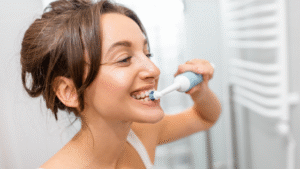
Keeping your teeth clean and healthy isn’t just about coming in for check-ups and hygiene appointments, although of course that is very important too. When it comes to your dental health and oral wellbeing, what you do at home is almost as important. In this blog post, we answer one of the biggest questions we get asked by patients is how often should you replace your toothbrush?
You should be brushing your teeth twice a day for two minutes. This is the optimum amount of time and frequency to keep your teeth and mouth healthy on a day-to-day basis. The reason why this is recommended is to help keep plaque and bacteria from coating the teeth, which can lead to gum disease (link ND gum disease blog) and tooth decay. Brushing your teeth prevents this building up while also helping to keep your breath fresh and your teeth looking bright.
Whether you choose to use an electric or manual toothbrush is up to you. In some cases, we may recommend switching to an electric toothbrush if we feel you would benefit from this. The most important thing is that you brush your teeth twice a day for two minutes, ensuring that every surface of each tooth is being cleaned. It’s worth mentioning that most electric toothbrushes have a timer which will let you know once your two minutes is up – how handy is that?!

Regardless of whether you use a manual or electric toothbrush, you should be replacing the head or the toothbrush itself every three months or so. Worn-out and frayed bristles can’t clean your teeth as well, which is why we recommend regular replacement.
In a lot of cases, your toothbrush or toothbrush head will have bristle indicators which change colour over time and use, to let you know when a new replacement is needed.
At home, we also recommend flossing regularly or using an interdental toothbrush. This can help get into the harder-to-reach areas between the teeth, where food and bacteria can lodge, causing build-up and eventually disease or decay. In some cases, we may also recommend a mouthwash and lifestyle or diet changes. For example, this could be cutting down on sugar intake or reducing or cutting out smoking entirely.

If you have any more questions about toothbrushes, toothpaste, flossing or any other part of your daily oral health routine, don’t hesitate to get in touch with us here at North Down Dental. Our friendly team will answer any questions you have, and if you still feel like you need to know more about your own personal oral health, book in for a check-up or a hygiene appointment now.






